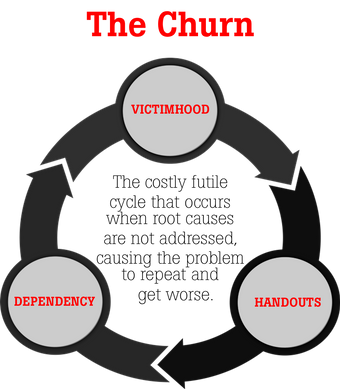Why Their Stories Must Be Heard

Exploring the Past of Homelessness to Build a Better Future
In 2019, nearly 560,000 people in the United States experienced homelessness, according to the United States Interagency Council on Homelessness. That’s more than the entire population of Sacramento, California, plus 50,000 more people. And on any given night, families with children make up one-third of everyone sleeping on the street.
Chronic homelessness is a vast, complex problem in America that drags individuals and families into a cycle of victimhood and dependency. At Solutions for Change, we call this The Churn, a costly, futile cycle that occurs when root causes of homelessness are not addressed, and the problem repeats and gets worse. When people fall into The Churn, it can seem almost impossible to escape the struggles, violence and temporary solutions.
But we know there’s hope. Solutions for Change helps people lift themselves from The Churn—permanently. We help homeless families and individuals become Overcomers by leading them from deep dependency and pain to interdependency, self-sufficiency and freedom. After two decades of transforming lives, we know it’s possible to help more homeless individuals in America become Overcomers.

First, however, the nation’s perspective on homelessness and our actions on this epidemic must change. We can no longer believe a one-size-fits-all policy or housing alone will end The Churn in our communities. To end the blight of homelessness, we need to comprehensively change our systems.
Even if we don’t intentionally make assumptions about the homeless, stereotypes of homelessness can still impact the way each of us thinks and acts. Harmful stereotypes can lead people to believe the homeless have less value as individuals, which makes it easier to justify forgetting about them. Those struggling with homelessness are seen as outcasts or unworthy. They are the ones who get left behind.
They are always a them, never an us.
And that’s the problem. When we think homelessness has nothing to do with us, we risk losing the empathy that pulls people out of homelessness. The lives and stories of homeless people are valid and worthy. We will only find real, lasting solutions when we remember there is no us and them. There is only one us.
Right now, however, chronic homelessness is an ongoing problem in America. Current attitudes toward homelessness and common remedies for it are not working. Over the next few months, we’ll be taking a look at America’s history with homelessness through the eyes of those who lived it. We will tell their stories to learn where our attitudes toward homelessness came from and show how the homeless can overcome to become the best of us.
Some topics we’ll cover include:
The rise of urban homelessness in the industrial revolution.
How the Great Depression brought homelessness to the forefront of public attention.
The struggles of homeless veterans.
The roots of chronic homelessness in the 1980s.
The facts about and solutions to homelessness today: Solutions for Change’s results-driven work to reshaping America’s safety net.
As the old saying goes, those who don’t know history are doomed to repeat it. Homelessness is a crisis and we cannot afford to replay the ways of the past. We must forge a new path to provide real solutions for change.
Follow us on this journey through the history of homelessness and help us build a brighter future at solutionsforchange.org.

